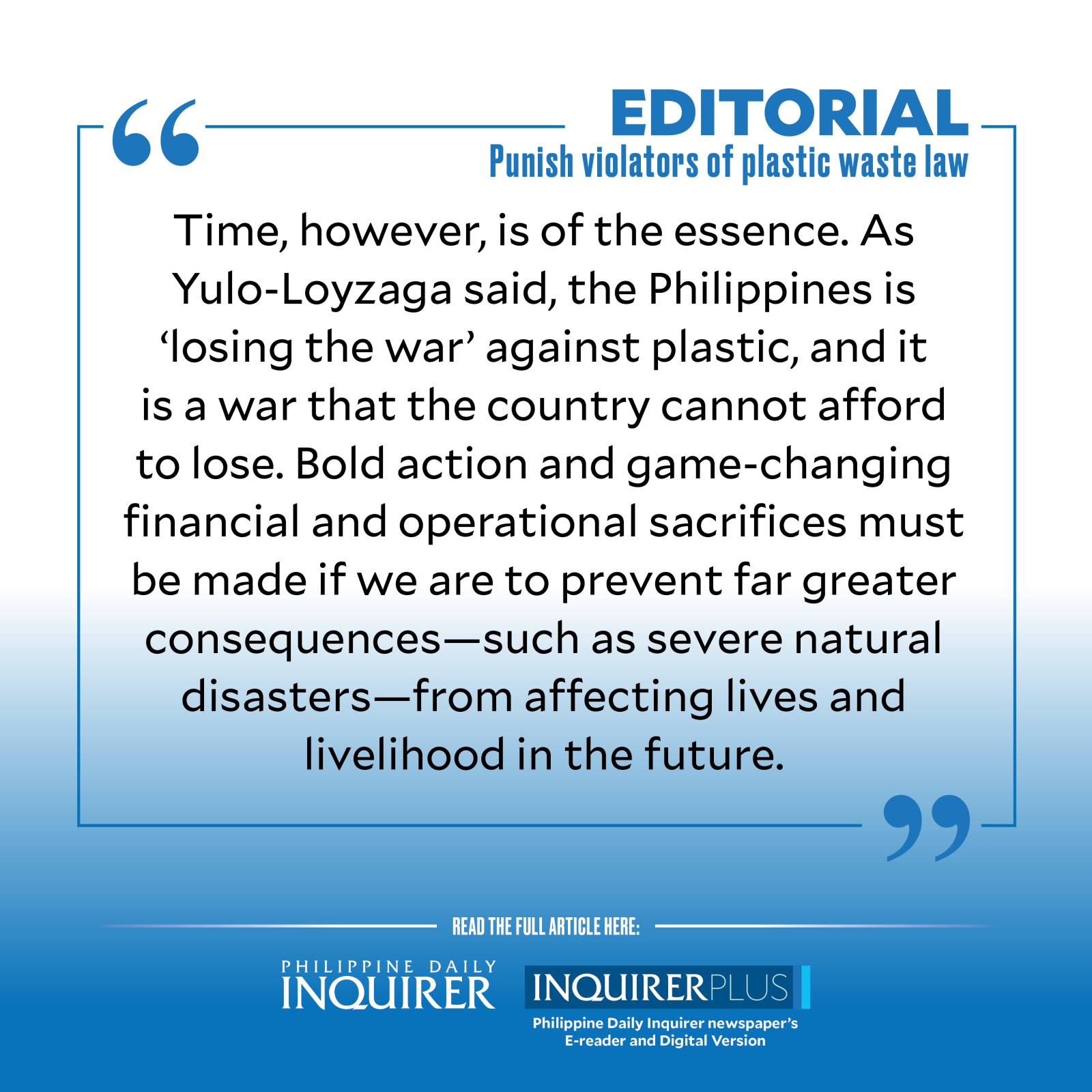Punish violators of plastic waste law

A year after the passage of the landmark Extended Producer Responsibility (EPR) Act that compelled large corporations to manage their plastic packaging wastes that are choking waterways and filling up landfills, compliance has been disappointingly dismal.
The Department of Environment and Natural Resources (DENR) has revealed that as of July, only 16.55 percent or just 662 of around 4,000 enterprises registered with the Department of Trade and Industry had submitted to the National Solid Waste Management Commission their programs for the proper management of their plastic wastes. These include plastic bags, sachets, labels, laminates, and both rigid and flexible plastic used for such products as beverage bottles, cutlery, plates, and straws, and shampoos and instant noodles, respectively.
Given these appalling numbers as of June this year, the DENR launched a timely campaign with the United Nations Development Programme to generate increased awareness of the EPR concept and get the “obliged enterprises”—companies with assets worth at least P100 million—to comply and help the country win the war against plastic.
An amendment to Republic Act No. 9003 or the Ecological Solid Waste Management Act of 2000, the EPR Act requires large-scale companies and enterprises to be environmentally responsible throughout the life cycle of their products—from manufacturing, usage, and post-consumer stage—by establishing programs and mechanisms that ensure the effective reduction, recovery, treatment, and recycling and disposal of their wastes, especially plastic packaging.
The performance standards have been set out: By end of this year, the covered companies must demonstrate the recovery or diversion of 20 percent of their 2022 plastic packaging footprint; then up to 40 percent by next year, and by a 10-percent increase every year until it hits 80 percent by 2028.
The urgency of these actions cannot be overstated as the Philippines produces as much as 61,000 metric tons (MT) of solid waste every day, a significant volume of which is plastic packaging. As DENR Secretary Maria Antonia Yulo-Loyzaga noted, of the “more than 163 million plastic sachet packets, 48 million shopping bags, and 45 million thin-film bags a day, 33 percent are disposed of in landfills and dumpsites, and around 35 percent are leaked into the open environment and eventually into our oceans and fields.” Indeed, a 2021 Science Advances study pointed out that the Philippines was the single largest contributor to ocean plastic waste at 356,371 MT.
Fortunately, some of the largest multinationals in the country have taken the EPR Act to heart and have invested in the proper management of their production and packaging waste. Some had started even prior to the passage of the law in keeping with their global commitment to minimize their impact on the planet. The Coca-Cola Company, for one, launched in 2018 its “World Without Waste” program by getting back as many of its bottles and cans, that are then recycled into new ones to keep them from becoming wastes. In the Philippines, the company invested in a recycling facility, and supported the set-up of over 800 collection points nationwide for used PET plastic bottles.
Nestlé Philippines, meanwhile, said it has been “plastic neutral” for three years, as it collects the same volume of plastic that it produces. As of July 2023, it has collected 77 million kilograms of post-consumer plastic waste over three years.
Tax incentives given by the EPR Act have given large-scale companies another reason to follow the law. Persuasion, however, can only go so far. With compliance rates at such a low level, it’s time for the Marcos administration to take more drastic measures such as penalizing noncompliant companies. Under the law, companies that do not register their EPR programs that pass DENR standards, or fail to meet their mandated diversion targets, will be fined from P5 million up to P20 million, and their business permits suspended. It is time to crack the whip and impose the penalties on the noncompliant companies, and release this information to the public not merely to shame but to convey the message that the government is serious in implementing the law.
Congress can reinforce such sanctions by passing a law imposing an excise tax on single-use plastics to urge companies to find other environment-friendly alternatives.
Undoubtedly, complying with the law comes at a price, and will impact the operations of covered companies. This is where cooperation from various sectors—from consumers to experts, government, and private firms—can come into play so that best practices can be shared and emulated.
Time, however, is of the essence. As Yulo-Loyzaga said, the Philippines is “losing the war” against plastic, and it is a war that the country cannot afford to lose. Bold action and game-changing financial and operational sacrifices must be made if we are to prevent far greater consequences—such as severe natural disasters—from affecting lives and livelihood in the future.




















